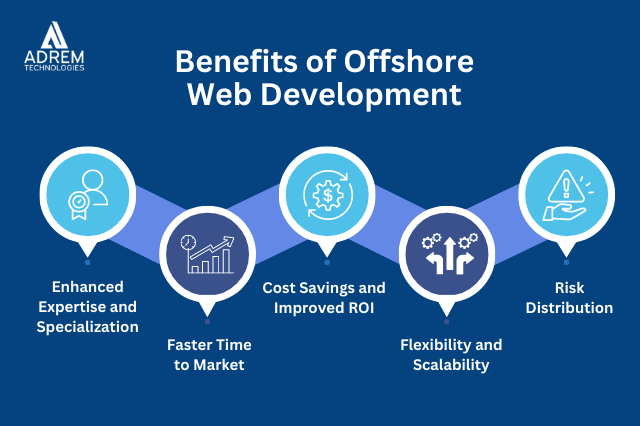Offshore Web Development For Your Business

Offshore Web Development For Your Business
In today’s interconnected world, businesses increasingly turn to offshore web development as a strategic approach to harnessing global talent and achieving cost-effective solutions. Offshore web development involves delegating website design, development, and maintenance tasks to specialized teams in different countries.
This blog post explores offshore web development’s benefits, challenges, and best practices, empowering businesses to make informed decisions in pursuing digital success.
What is Offshore Web Development?
Offshore web development refers to the process of outsourcing web development projects to teams located in different countries. Instead of relying on in-house teams or local agencies, businesses collaborate with offshore development partners to design, develop, and maintain their websites and web applications.
Offshore web development involves engaging with offshore teams or companies through a structured workflow. This typically includes:
- Initial project scoping and requirements gathering
- Design and development phases
- Quality assurance testing
- Deployment
- Ongoing support and maintenance
The client and offshore team use multiple communication channels, project management tools, and agreed-upon techniques to communicate efficiently and achieve project success.
Benefits of Offshore Web Development
Offshore web development offers several benefits to businesses seeking web development solutions. These benefits include:
-
 Enhanced Expertise and Specialization
Enhanced Expertise and Specialization
Offshore web development allows businesses to work with specialists with deep knowledge and experience in specific areas of web development. These experts stay updated with industry trends, best practices, and emerging technologies. Their proficiency in their respective domains ensures the delivery of high-quality web solutions that meet industry standards and exceed client expectations.
-
Faster Time to Market
Offshore development teams often follow efficient development processes and have experience working on diverse projects. This expertise, coupled with round-the-clock work cycles enabled by time zone differences, can accelerate development timelines and help businesses bring their websites to market faster.
The expedited time-to-market and access to specialized expertise further solidify the value of offshore development as a strategic choice for businesses seeking to stay competitive in the fast-paced digital landscape.
-
Cost Savings and Improved ROI
Offshore web development can significantly reduce labor costs, especially when compared to hiring in-house development teams or engaging local agencies. This cost advantage, combined with the potential for increased productivity and efficiency, can result in improved return on investment (ROI) for businesses.
With an improved ROI and access to specialized expertise, businesses can gain a competitive edge and propel their digital initiatives to new heights of success.
-
Flexibility and Scalability
Offshore development allows businesses to scale their web development efforts as needed quickly. Offshore teams can readily accommodate these requirements by expanding a website’s functionality, adding new features, or adapting to changing market demands.
By leveraging the expertise of offshore development teams, businesses can speed up the time-to-market for new features or products. The ability to quickly roll out updates and enhancements gives companies a competitive edge.
-
Risk Distribution
By working with an offshore development team, you can distribute the risks associated with the project. Your in-house and offshore teams are responsible for meeting deadlines and delivering quality work.
The collaboration between in-house and offshore teams brings together diverse skills and expertise. The combined knowledge of both teams allows for a comprehensive approach to problem-solving, enabling innovative solutions and improved project outcomes.
Key Challenges and Mitigation Strategies
Offshore web development presents certain challenges businesses should be aware of and address effectively to ensure successful collaboration. Here are some key challenges and mitigation strategies:
-
Communication and Collaboration
Effective communication is essential for successful offshore web development. Language barriers, cultural differences, and time zone variances can present challenges. Employing collaboration tools, maintaining regular communication channels, and establishing clear project management frameworks are vital to overcoming these obstacles.
-
Quality Assurance and Project Management
Ensuring quality and maintaining project timelines can be a concern when working with offshore teams. Implementing robust quality assurance processes, conducting regular progress reviews, and defining clear project milestones can help mitigate these risks.
Foster a culture of knowledge sharing and collaboration between the onshore and offshore teams. Regular meetings, training sessions, and brainstorming sessions allow for exchanging ideas and expertise, improving project outcomes.
-
Data Security and Intellectual Property Protection
Offshore web development involves sharing sensitive business information. Choosing trustworthy offshore providers with established data security protocols and enforcing strict confidentiality agreements to safeguard intellectual property is crucial.
Established offshore providers maintain dedicated IT security teams responsible for data protection, threat detection, and incident response. These teams continuously monitor for potential security threats and promptly address any issues.
Best Practices for Successful Offshore Web Development
To ensure successful offshore web development projects, businesses can follow these best practices:
Define Project Requirements and Objectives: Clearly articulate your project requirements, objectives, and success criteria to offshore development teams. This helps align expectations and ensures a shared understanding of the project’s scope.
Thorough Vendor Evaluation: Conduct extensive research to select a reputable offshore web development provider. Evaluate their expertise, experience, portfolio, client testimonials, and compliance with industry standards.
Effective Communication and Collaboration: Establish efficient communication channels, leverage project management tools, and maintain regular updates and feedback loops with the offshore team. Encourage open dialogue to address any challenges promptly.
Project Planning and Documentation: Develop a comprehensive project plan that outlines timelines, milestones, deliverables, and dependencies. Clear documentation helps align all stakeholders and minimizes the risk of misunderstandings.
Continuous Monitoring and Quality Assurance: Regularly monitor project progress, review deliverables, and conduct quality assurance tests to ensure adherence to specifications and maintain high work standards.
Final Thoughts
Successful offshore web development allows businesses to focus on their core competencies, gain access to specialized skills, and capitalize on global expertise. The collaboration between onshore and offshore teams fosters innovation, cross-cultural learning, and effective project execution.
To unlock the full potential of offshore web development, businesses should carefully select offshore partners, foster open communication, embrace collaboration, and establish clear project goals. By leveraging the benefits, addressing challenges, and following best practices, businesses can harness the power of offshore web development to drive their digital success, establish a strong online presence, and stay ahead in the dynamic digital landscape.
If you’re seeking to outsource your web project, Adrem Technologies is your trusted partner. With a track record of success, we offer reliable web development solutions. Contact us today for a comprehensive discussion and a complimentary free quotation.

